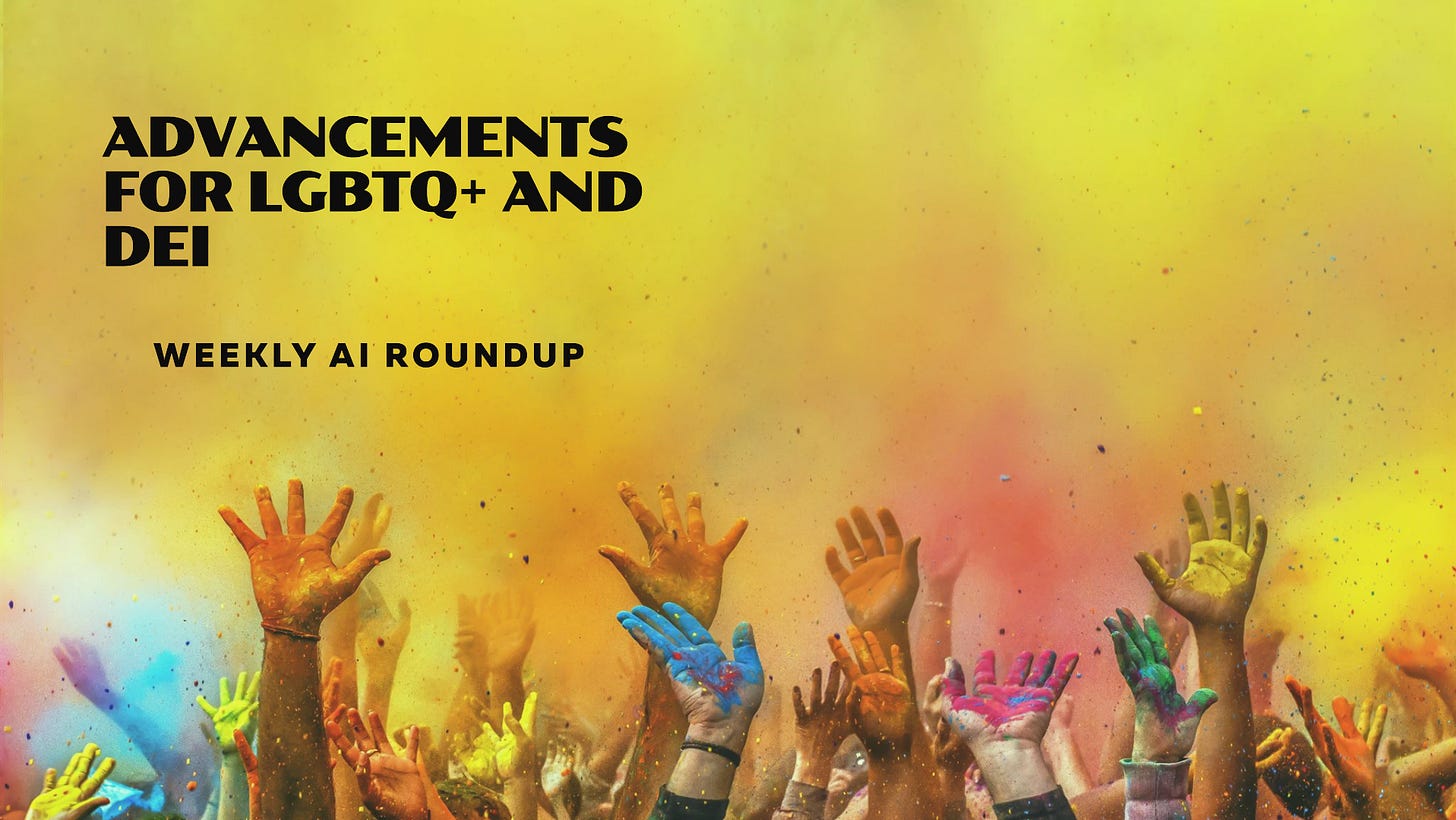It comes as no surprise that AI’s reach has extended to domains promoting social equity. It is heartening to see tools and tech tailored to uplift historically under-represented communities. However, the onus is with the users and administrators to promote adopting these tools and that means a commitment to DEI, specifically the E in the abbreviation - Equity - the quality of being fair and impartial, regardless of sexual orientation, race, gender, color or religion.
In today’s edition of AI roundup we explore the tools moving the needle with creating an equitable environment for under-represented communities. We also discuss strategies that workplace administrators and leaders can take to promote its adoption.
Space to Belong - Google Maps
Motivated by the pandemic driven closure of small businesses, especially the ones that supported LGBTQ communities, Google pioneered the Space to Belong initiative. An innovative Google Maps feature that showcase queer friendly businesses in search results. Businesses can easily self identify as spaces of belonging - such as gender neutral restrooms, Transgender safespace, and LGBTQ friendly. Since the feature’s rollout, search activity for LGBTQ friendly spaces have been restored to pre-pandemic levels. Check out https://pride.google/space-to-belong/
Enhancing Safety with automated guardrails
The world’s largest suicide prevention platform for LGBTQ community members - The Trevor Project - features a Crisis Contact simulator. An AI powered counselor training tool that simulates digital conversations with LGBTQ youth in crisis.
The bias and hate against LGBTQ community is ever present, as highlighted by the atrocious violence at Pulse nightclub in Orlando. Driven to protect the community from senseless violence, GeoSure a travel safety company makes it transparent for LGBTQ customers to gauge the safety levels of a neighborhood with a safety rating.
Dating app Tinder automatically filters profiles that identify as openly gay, lesbian, bisexual, queer or transgender in nations where same-sex relationships or acts are still criminalized.
Promoting Equity for the under-represented
Barefoot Law is pioneering the expansion of legal access in countries like Uganda with one solicitor to twenty-thousand individuals. With the launch of AI powered tool Winnie, Ugandans now have access to pro-bono legal services in rural areas that had historical barriers for basic legal access. Winnie has already helped 800,000 users and resolved over 20,000 cases.
Textio - an AI powered tool analyzes job postings and internal communications, to help companies avoid unconscious bias. The tool provides feedback on language inclusivity and feedback to avoid discriminatory language with the goal to make the postings more appealing to diverse candidates.
AI powered platform - Diversio helps companies measure and improve their DEI performance. Diversio integrates with existing HR systems to provide real-time insights, benchmarking tools, and an “inclusion score.” The AI analyzes data to identify biases and suggests specific actions to promote a more inclusive workplace. Companies like Honda and Unilever have used Diversio to enhance their DEI efforts
Which brings us to the strategy aspect.
Driving lasting change
We outline five AI driven strategies companies can take to instill durable mechanisms to ensure DEI thrives in the workplace
Utilizing AI for Data-Driven DEI Decisions. AI can gather and analyze diversity data to highlight biases and unfair practices within the workplace. Advanced AI solutions help compile employee information, track promotions, pay, and retention rates, and identify discrepancies to ensure equitable HR decisions. AI-backed DEI dashboards like Diversio can show detailed employee metrics to identify and rectify any unfair treatment based on gender, age, or race.
Correcting Unconscious Bias. AI can help mitigate unconscious bias by using systematic algorithms and diverse training datasets. However, it’s crucial to vet AI datasets to avoid inherent biases. Amazon’s AI recruitment tool was found to be biased against women due to the male-dominated training data, highlighting the need for careful dataset selection.
Building Trust and Team Cohesion. Trust and psychological safety are essential for high-performance teams. AI can support this by identifying communication patterns and helping address potential issues of isolation or dissatisfaction, especially in remote work settings. Google’s research found that psychological safety, or the ability to take risks without fear, is key to team success.
Enhancing Recruitment and Hiring Practices. AI tools can help create unbiased job descriptions and remove irrelevant information from applications, ensuring a fair hiring process. These tools can also provide real-time feedback on the inclusivity of language used in job postings. Ongig and Textio Text Analyzer uses AI to identify and replace biased language in job descriptions, broadening the talent pool and ensuring more inclusive recruitment.
Promoting Recognition and Reward Programs. AI-driven platforms can facilitate consistent and transparent recognition and reward systems, boosting morale and meeting DEI goals. These platforms can also integrate with communication tools to celebrate achievements. Bonusly allows peer-to-peer recognition and uses analytics to highlight team members’ strengths, while Evergreen rewards contributions by planting trees in employees’ honor.


